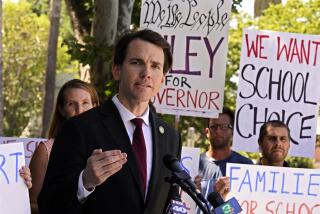FEC Halting Transfer of State Money for Federal Candidacies
- Share via
WASHINGTON — The government is putting an end to a practice that has allowed candidates to launch bids for federal office by transferring donations left over from past state campaigns.
The Federal Election Commission voted, 6 to 0, earlier this week to change its rules and end such transfers, which in past years have been used by such candidates as 1988 Democratic presidential nominee Michael S. Dukakis.
And in a move that could even more dramatically alter campaign financing, the FEC agreed to consider another rule change that would prevent federal candidates from automatically “rolling over” leftover funds from one year to the next.
If the second change is approved, members of Congress with perennially large war chests would no longer be able to simply carry over huge surpluses from their last election to their next campaign or transfer money from their past House campaign to run for higher office. To move the money, a candidate would have to return to his books, find out who each contributor was and get that person’s written authorization to do so.
“This would be really radical change,” said FEC spokeswomen Sharon Snyder.
The FEC voted to send the second proposal out for public comment and to study it further.
The commission voted to change federal campaign regulations and end the straight transfer of state campaign funds to federal campaigns.
Snyder said the change, however, will not take effect until after this year’s elections.
Several candidates over the years have used leftover money from their state campaigns to launch federal candidacies, including Dukakis, who in 1988 transferred money from his Massachusetts gubernatorial campaign to his unsuccessful presidential campaign, Snyder said.
This year, New Hampshire Gov. Judd Gregg has been criticized by his Republican opponent for converting $219,000 from his 1990 gubernatorial campaign for a bid for the U.S. Senate.
In recommending changing the rules, FEC lawyers argued that the practice runs contrary to the spirit of campaign finance reforms that limited individual donations to $1,000 per federal candidate per election and prohibited all corporate and union contributions.
More to Read
Get the L.A. Times Politics newsletter
Deeply reported insights into legislation, politics and policy from Sacramento, Washington and beyond. In your inbox three times per week.
You may occasionally receive promotional content from the Los Angeles Times.










